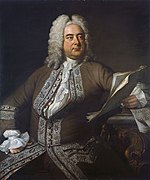Ode per il giorno di santa Cecilia
| Ode per il giorno di santa Cecilia | |
|---|---|
 | |
| Titolo originale | Ode for St. Cecilia's Day |
| Lingua originale | inglese |
| Genere | cantata |
| Musica | Georg Friedrich Händel |
| Fonti letterarie | John Dryden |
| Epoca di composizione | 1739 |
| Prima rappr. | 22 novembre 1739 |
| Teatro | Teatro in Lincoln's Inn Fields, Londra |
Ode per il giorno di santa Cecilia (HWV 76) è una cantata composta da Georg Friedrich Händel nel 1739, adattando il poema del poeta inglese John Dryden. Il titolo della cantata è ispirato a santa Cecilia, la santa patrona dei musicisti. Il tema principale del poema è la teoria pitagorica di harmonia mundi, che la musica fosse una forza centrale nella creazione della Terra. La première è avvenuta il 22 novembre 1739 al teatro in Lincoln's Inn Fields, Londra.
Ebenezer Prout ha scritto a proposito di diverse sfaccettature della strumentazione di Händel nel lavoro.[1] Edmund Bowles ha scritto sull'utilizzo di Händel dei timpani in questa composizione.[2]
Movimenti
[modifica | modifica wikitesto]- Ouverture: Larghetto e staccato—allegro—minuetto
- Recitativo (tenore): From harmony, from heavenly harmony
- Coro: From harmony, from heavenly harmony
- Aria (soprano): What passion cannot music raise and quell!
- Aria (tenore) e Coro: The trumpet's loud clangour
- Marcia
- Aria (soprano): The soft complaining flute
- Aria (tenore): Sharp violins proclaim their jealous pangs
- Aria (soprano): But oh! What art can teach
- Aria (soprano): Orpheus could lead the savage race
- Recitativo (soprano): But bright Cecilia raised the wonder higher
- Grande Coro con (soprano): As from the power of sacred lays
Testi
[modifica | modifica wikitesto]From Harmony (Recitativo)
[modifica | modifica wikitesto]TENOR: From harmony, from heavenly harmony
This universal frame began.
When nature, underneath a heap
Of jarring atoms lay,
And could not heave her head.
The tuneful Voice, was heard from high,
Arise! Arise!
Arise ye more than dead!
Then cold, and hot, and moist, and dry,
In order to their stations leap!
And music's power obey!
And music's power obey!
From Harmony (Coro)
[modifica | modifica wikitesto]CHORUS: From harmony, from heavenly harmony,
This universal frame began.
Through all the compass of the notes it ran,
The diapason closing full in man.
What Passion Cannot Music Raise and Quell
[modifica | modifica wikitesto]SOPRANO: What passion cannot music raise, and quell?
When Jubal struck the chorded shell,
His listening brethren stood 'round.
And wondering on their faces fell,
To worship that celestial sound!
Less than a god they thought there could not dwell
Within the hollow of that shell
That spoke so sweetly and so well.
What passion cannot Music raise and quell?
The Trumpet's Loud Clangour
[modifica | modifica wikitesto]TENOR: The trumpet's loud clangour excites us to arms,
With shrill notes of anger and mortal alarms,
The double-double-double beat,
Of the thund'ring drum,
Cries hark! Hark! Cries hark the foes come!
Charge! Charge! Charge! Charge!
'Tis too late, 'tis too late to retreat!
Charge 'tis too late, too late to retreat!
The Soft Complaining Flute
[modifica | modifica wikitesto]SOPRANO: The soft complaining flute
In dying notes discovers
The woes of hopeless lovers,
Whose dirge is whispered by the warbling lute.
Sharp Violins Proclaim
[modifica | modifica wikitesto]TENOR: Sharp violins proclaim,
Their jealous pangs,
And desperation!
Fury, frantic indignation!
Depth of pains, and height of passion,
For the fair disdainful dame!
But Oh! What Art Can Teach
[modifica | modifica wikitesto]SOPRANO: But oh! what art can teach,
What human voice can reach
The sacred organ's praise?
Notes inspiring holy love,
Notes that wing their heavenly ways
To join the choirs above.
Orpheus Could Lead The Savage Race
[modifica | modifica wikitesto]SOPRANO: Orpheus could lead the savage race,
And trees uprooted left their place
Sequacious of the lyre:
But bright Cecilia raised the wonder higher:
When to her Organ vocal breath was given
An Angel heard, and straight appeared –
Mistaking Earth for Heaven.
As From The Power Of Sacred Lays
[modifica | modifica wikitesto]SOPRANO: As from the power of sacred lays
The spheres began to move,
And sung the great Creator's praise
To all the blest above;
So when the last and dreadful hour
This crumbling pageant shall devour,
The trumpet shall be heard on high,
CHORUS: The dead shall live, the living die,
And music shall untune the sky
Note
[modifica | modifica wikitesto]- ^ Ebenezer Prout, Handel's Orchestration (Continued), in The Musical Times and Singing Class Circular, vol. 25, 495ª ed., The Musical Times and Singing Class Circular, 1º maggio 1884, pp. 256–260, DOI:10.2307/3356425, JSTOR 3356425.
- ^ Edmund A. Bowles, The Double, Double, Double Beat of the Thundering Drum: The Timpani in Early Music, in Early Music, vol. 19, 3ª ed., agosto 1991, pp. 419–435, DOI:10.1093/earlyj/XIX.3.419, JSTOR 3127779.
Collegamenti esterni
[modifica | modifica wikitesto]- (EN) Spartiti o libretti di Ode per il giorno di santa Cecilia, su International Music Score Library Project, Project Petrucci LLC.
- (EN) Ode per il giorno di santa Cecilia, su AllMusic, All Media Network.
- (EN) Ode per il giorno di santa Cecilia, su MusicBrainz, MetaBrainz Foundation.
- Partitura dall' Händel-Werkausgabe, su daten.digitale-sammlungen.de, Lipsia, Friedrich Chrysander, 1866.
| Controllo di autorità | VIAF (EN) 182230890 · LCCN (EN) n88611383 · GND (DE) 300064578 · BNF (FR) cb13913104q (data) |
|---|
